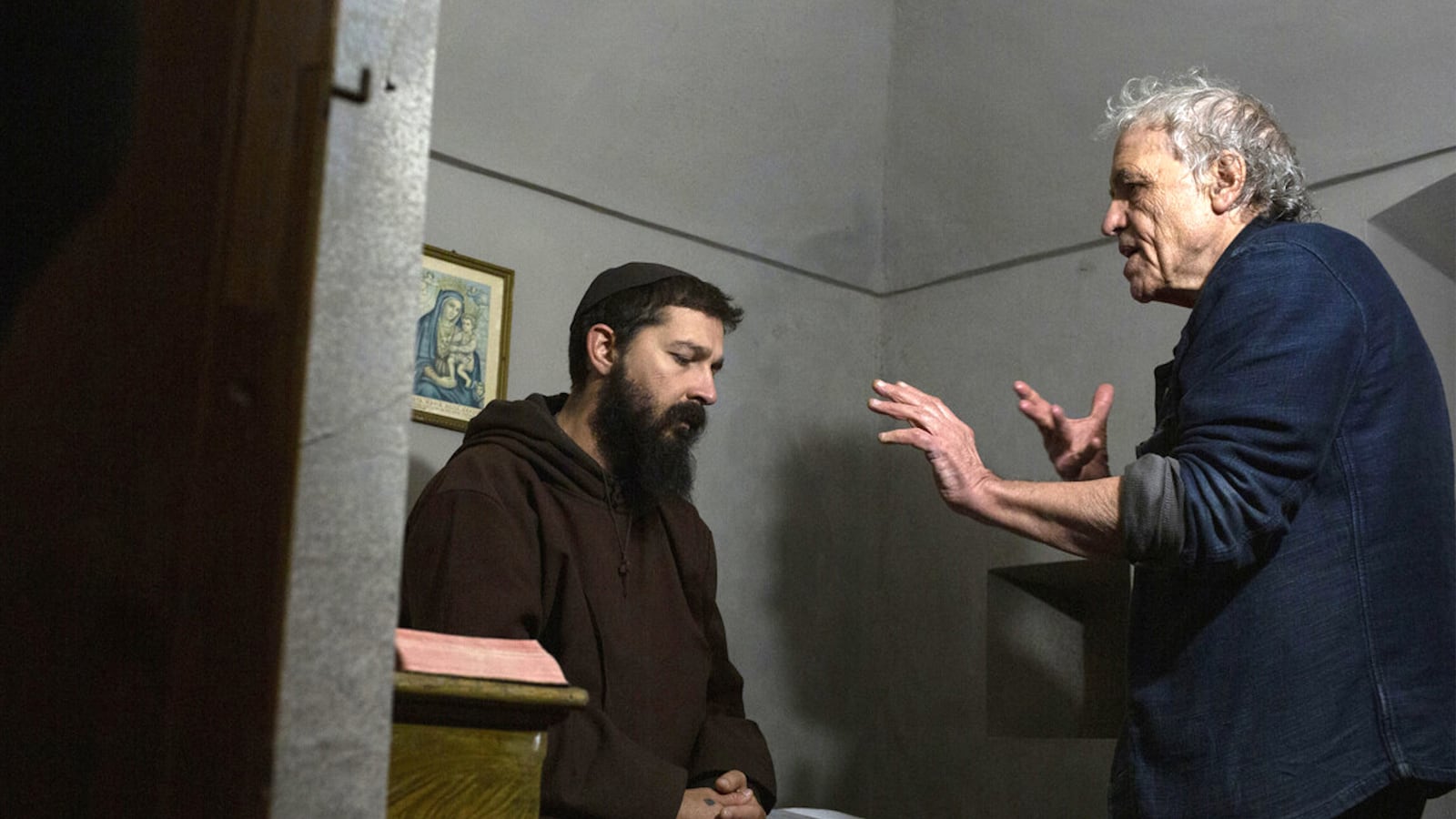Last week, actor Shia LaBeouf released a video of a taped discussion between himself and Bishop Robert Barron of Word on Fire Catholic Ministries. During the talk, LaBeouf, who was bar mitzvah’d, revealed that he had converted to Catholicism while studying for the role of Padre Pio in a new film depicting the early years of the late Franciscan Capuchin friar and mystic’s life, as he battles spiritual demons and tries to control his burning rage (the exclusive was given to Fox News).
The director of Padre Pio, Abel Ferrara, sat down with me at the Venice Film Festival, where the film is making its premiere. He says he was inspired to make a film about Pio because not only is he known as “the radical-rebel saint” whose “statue is in every drug dealer’s place I’ve been at,” but the clergyman also came from the same part of Italy as his grandfather. Ferrara also maintains that LaBeouf had already converted to Catholicism prior to being cast in the film—this after Alex Lebovici, the film’s executive producer, had recommended LaBeouf to Ferrara.
“I knew of his work. We Zoomed up, and he had just went through this [Catholic] conversion. We connected,” Ferrara tells The Daily Beast. “For me, it’s instinct with the actor. I felt it. He immediately bought in. For him, it was something larger than life. He believes. So it was a miracle that we came to him.”
Padre Pio, who was later venerated as a saint, had early Fascist ties before eventually turning his back on Mussolini. He earned a reputation in the wake of World War I as a symbol of hope for those society had cast aside, and was thought to be a miracle-worker, as well as one possessed of the power of healing and prophecy. Perhaps his finest achievement is raising millions to erect the Casa Sollievo della Sofferenza hospital in San Giovanni Rotondo, Italy.
“I’m a Buddhist, so I don’t believe in miracles… I don’t believe in the devil,” says Ferrara. “But you want a miracle? He built a fuckin’ $35 million hospital. You ride into the poorest place, on a donkey, and 25 years later you built a $35 million hospital? There’s your fuckin’ miracle right there.”
The film, which traces Padre Pio’s early years up until his first stigmata, was shot in November 2021 in Puglia, Italy, where the real-life events occurred. According to Ferrara, once LaBeouf was cast, he jumped in his truck and headed toward a Franciscan Capuchin seminary outside L.A., where he embedded with the friars, and they “took him in and accepted him.”
LaBeouf’s religious conversion appears to be part of a redemption arc in the wake of a lawsuit filed against him by the singer FKA Twigs accusing the Transformers star of sexual battery, assault, and infliction of emotional distress. Joining Twigs in the lawsuit was another LaBeouf ex, stylist Karolyn Pho, who alleged in the suit that he “drunkenly pinned her to a bed and head-butted her, enough that she bled,” reported The New York Times. LaBeouf has said he is “ashamed” of his past behavior and is on a journey toward sobriety.
I asked the 71-year-old Ferrara if he had any reservations about casting LaBeouf in the role of Padre Pio given the disturbing allegations against him.
“Once I Zoomed up with him, I’m talking to a different guy. I didn’t know that guy. I knew a guy who was going to commit to my movie,” Ferrara reasons. “I know the journey he’s on. I’ve struggled with drugs and alcohol, and I’m sober now for 10 years. So I know where he’s at. No, I had no reservations.”
Ferrara, of course, is a celebrated cult filmmaker and Bronx native known for plumbing the depths of his character’s psyches, whether in King of New York and Bad Lieutenant or the biopic Pasolini, featuring frequent collaborator Willem Dafoe. Since LaBeouf is positioning Padre Pio as a part of his aforementioned redemption arc, it will surely affect the way viewers see the film—though Ferrara is well aware of this.
“I’m happy he’s doing what he’s doing. I’m happy he’s sober, and I’m happy he has a kid. He’s doing good, bro. He just got the gig with Coppola [Megalopolis],” says Ferrara. “How people see things, you know, you’re gonna see things that way, and in a year they’re gonna see it a different way, and 20 years from now they’re gonna see… I’m an old man. I see cats watching films I’ve made 40 years ago, and whatever I was going through 40 years ago, nobody knows that now.”
He continues: “Films don’t exist in a vacuum. The actors have lives. The directors have lives. In this world right now, nobody is separating anything from anything. This film is about Shia’s struggle, as much as it is about Padre Pio, because we got all this 1920s shit in it, there are scenes where he’s him, working his own shit out. And these are the types of films that I need to make because I gotta work my own shit out.”
When I mention that it’s the 3oth anniversary of Bad Lieutenant, his cult classic about a dirty, drug-addicted cop (a career-best Harvey Keitel) on the path to salvation, Ferrara argues that the film’s had such a lasting impact because of what Keitel brought to the role—and how he, like LaBeouf, seemed to be working his own issues out through the character.
“When you have the actor, Harvey, going through it—you’re filming a guy going through a personal journey that’s very real, and he was able to tap into it. And as long as you got that, you’ve got a truth that’s not going anywhere,” say Ferrara. “It’s like with Shia. If the actor is in the right spot, if he’s in an honest place, then the movie is forever.”






